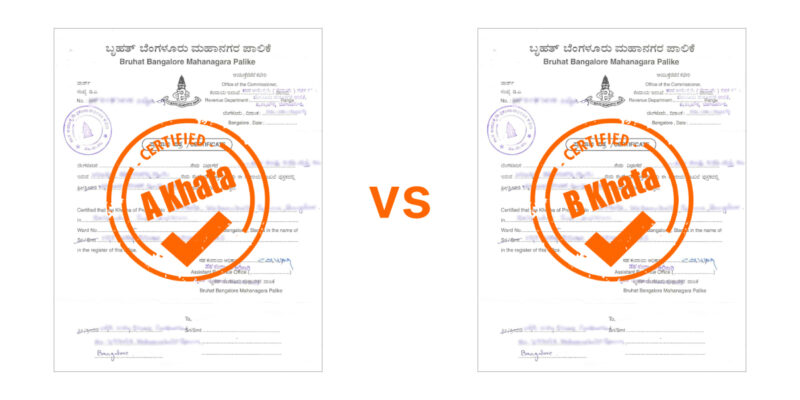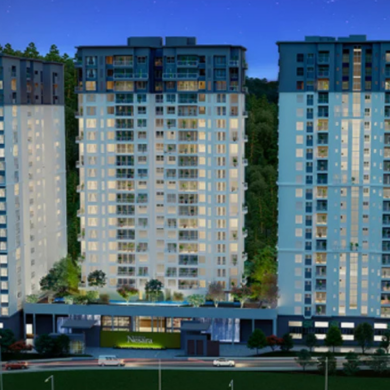
A Khata properties are legally compliant and ideal for transactions, while B Khata properties may lack full compliance, posing risks for buyers. Knowing these differences is essential for informed real estate decisions.
Understanding the legal aspects of buying a property in Bangalore is paramount, whether residential or commercial. The Bruhat Bengaluru Mahanagara Palike (BBMP) – responsible for the city’s civic and infrastructural developments – issues the Khata certificate in Bangalore, that is a crucial document determining the legal status of a property.
Property owners must have this certificate to prove ownership and pay Bangalore property tax. The BBMP issues two types of Khata certificates: A Khata and B Khata. Let us delve into the details to understand A Khata certificate benefits, B Khata property risks, and the difference between A Khata and B Khata properties.
Table of Contents
Why Should You Get Khata Certificate?
Possessing Khata certificate offers numerous benefits and ensures your property complies with all legal requirements, enhancing its value and utility. Having Khata certificate is essential for all property owners in Bangalore, as it is necessary for:
- Obtaining building licenses
- Getting layout plan approval
- Securing bank loan
- Acquiring electricity connection
- Facilitating water connection
Who is Eligible for Khata?
If you are the legitimate title owner of a property, you can apply for Khata certificate in Bangalore. To apply, you need to provide the following documents:
- Title deed
- Encumbrance certificate
- Property tax receipts
Present these documents to the Revenue Officer or Assistant Revenue Officer for verification. You can also apply for Khata at any Karnataka government-approved Citizens Service Centre.
Important: Collect the acknowledgement receipt after submitting the duly filled application form in the approved format. This receipt is crucial for tracking your application status.
What is A Khata Certificate?
A Khata certificate is a legal document that validates the ownership details of a property in Bangalore. Issued by the BBMP, this certificate includes vital information regarding the property’s size, area, location, and type (residential or commercial). The Khata system was introduced in 2007 to simplify Bangalore property tax collection.
A Khata Properties
A Khata certificate legally validates that a property has secured all necessary approvals from respective bodies and is built adhering to prescribed norms, including building byelaws and property taxation. In other words, A Khata property is fully compliant and legal.
Benefits of Owning A Khata Property
- Ease in obtaining home loan, building plan, and OC (occupation certificate)
- Simplified process for transferring ownership or selling the property
- Eligibility for trade licenses and permission for property expansion or renovation
- No future legal issues
Procedure to Get A Khata Certificate
- Acquire an attested sale deed and encumbrance certificate from the sub-registrar’s office
- Download the application form from the BBMP website or visit the nearest BBMP office
- Fill in the form and enclose all required documents – either attested or notarised – and submit the application
- You could receive the A Khata certificate in just over a month
- If there is a delay of more than two months, you can file an RTI (Right to Information) application
B Khata Properties
B Khata properties in Bangalore lack legal standing. While BBMP maintains a separate register for these, they are still considered illegal despite the collection of civic charges and taxes.
Why is a Property Categorised as B Khata?
- Flouting building bylaws during construction
- Constructing on revenue land
- Building in unauthorised layouts
- Lacking completion or issuance certificates
Disadvantages of Owning a B Khata Property
- Inability to trade property
- Prohibition of construction activities, such as property expansion
- Non-transferable ownership
A ruling by the Karnataka High Court in December 2014 nullified any legal status of B Khata properties, rendering them illegal. Paying taxes or civic charges does not legalise a B Khata property. Understanding the difference between A Khata and B Khata properties is essential to avoid B Khata property risks and ensure the security of your investment.
Difference Between A Khata and B Khata Properties
The table below highlights the key differences between A Khata properties and B Khata properties, helping you understand their distinct features and implications.
| A Khata | B Khata |
| Property taxes are paid by the title holder | A separate register is maintained by BBMP to collect tax |
| Permission is granted for construction | No permission for construction |
| Eligible to avail loans | Loans are denied |
| Sale of property and transfer of ownership are allowed | Sale, transfer of ownership, or construction are not allowed |
| Trade license can be obtained | Trade license cannot be obtained |
| Deemed legal properties | Illegal, as per the 2014 ruling of Karnataka High Court |
| BBMP grants permission to renovate or extend the present property | Any kind of renovation or extension is strictly prohibited by BBMP |
This comparison helps highlight the significant difference between A Khata and B Khata properties. Owning A Khata property offers numerous benefits and ensures compliance with legal norms, while B Khata properties pose several risks and legal limitations.
Advantages of Owning A Khata Property
Owning A Khata property certifies that the property is legal, and offers numerous benefits to the owner.
- Legally validated property
- Eligibility for loans
- Ease of selling or transferring ownership
- Permission for construction and renovations
- Simplified process for obtaining trade licenses
- No future legal issues
Risks Associated with Owning B Khata Property
Owning B Khata property comes with significant risks due to its illegal status.
- No legal standing
- Ineligibility for loans
- Restrictions on construction and renovations
- Inability to sell or transfer ownership
- Potential for future legal complications
As B Khata property is considered illegal, owners can only pay taxes and civic charges, but face many limitations and potential legal troubles.
How to Convert B Khata Property into A Khata Property
This conversion is essential to gain the full benefits and legal standing of the property. Follow these steps to convert your property:
Step 1: Clear All Dues
Before applying for the conversion, ensure that all dues – such as property tax, penalties, DC conversion charges, and betterment charges levied by BBMP – are cleared.
Step 2: Submit Required Documents
Gather and submit the below documents to the Assistant Revenue Officer, BBMP:
- Certified copies of paid property tax receipts
- Sale deed of the property
- Title deed, in the name of the lawful owner
- Conversion certificate of the land (if it was previously agricultural land)
- Clear blueprint showing the property’s location and specifications
- Certificates or receipts of any improvement charges paid to BBMP
- Occupancy certificate
- Khata extract certificate
Step 3: Online Application (Optional)
You can also complete the process online:
- Visit the Sakala website
- Log in and choose the Khata transfer option from the menu
- Fill in the required data
- Upload the mandatory documents listed above
- You will receive a Sakala number to track the status of your request
- You will receive SMS updates at every step of the process
Once your A Khata certificate is ready, you will be notified, and you can either download it or visit BangaloreOne to get a copy.
By following the above steps, you can successfully convert B Khata property into A Khata property, ensuring legal compliance and unlocking the full benefits of property ownership in Bangalore.
The Importance of Verifying the Khata Certificate Before Buying a Property
Ensuring the property has A Khata certificate rather than B Khata certificate is essential for securing legal and financial benefits. It is highly recommended that you consult a legal practitioner before purchasing property. A lawyer specialising in real estate can verify the Khata certificate and ensure that all documentation is in order, ensuring peace of mind.
Why Verify the Khata Certificate?
- Secure Legal Compliance: A Khata certificate is mandatory for all properties under the Bruhat Bengaluru Mahanagara Palike (BBMP)
- Facilitate Loans and Approvals: It is essential for obtaining building licenses, layout plan approvals, and bank loans
- Ensure Utility Access: Possessing A Khata certificate makes getting electricity and water connections easier
- Avoid Future Legal Issues: Verifying the Khata certificate ensures that the property complies with all legal norms, avoiding potential legal troubles
By thoroughly checking the Khata certificate and consulting a legal practitioner, you can ensure a smooth and secure property transaction in Bangalore.
Final Thoughts
A Khata certificate provides legal validation and numerous benefits, including eligibility for loans, permission for construction and renovations, and ease of transferring ownership. On the other hand, B Khata certificate comes with significant restrictions and risks, as it lacks legal standing and imposes limitations on property usage.
Ensure you verify the Khata certificate status with the help of a legal expert before purchasing a property. This verification process is crucial to confirm that the property has A Khata certificate, ensuring legal compliance and avoiding future complications.
By understanding the difference between A Khata and B Khata properties and the importance of possessing A Khata certificate, you can take informed decisions and secure your investment in Bangalore real estate.
FAQs
1. What is a Khata certificate?
Khata certificate is a legal document issued by BBMP that validates the ownership details of a property in Bangalore. It contains essential information about the property, such as size, area, location, and type (residential or commercial).
2. Why is a Khata certificate important?
Khata certificate is important because it is required to obtain building licenses, layout plan approvals, and bank loans; it facilitates acquisition of electricity and water connections; serves as proof of ownership; and is necessary for property tax payments.
3. What is the difference between A Khata and B Khata properties?
The differences between A Khata and B Khata properties are, A Khata properties are legal and comply with all building byelaws and property tax requirements, while B Khata properties do not have legal standing and are recorded in a separate register for tax collection purposes. A Khata properties are eligible for loans, construction, renovation, and transfer of ownership; while B Khata properties are not eligible for the same.
4. Can B Khata properties be converted to A Khata?
Yes, B Khata properties can be converted to A Khata, if they do not have major deviations from approved plans, and all outstanding dues such as property tax, penalties, and betterment charges are cleared. The conversion process involves submitting the required documents to the BBMP for verification.
5. What documents are needed to apply for a Khata certificate?
Following documents are needed to apply for a Khata certificate: Title deed, Encumbrance certificate, Property tax receipts, Sale deed (for A Khata conversion), Conversion certificate (if applicable), Property blueprint, Improvement charge receipts, Occupancy certificate, and Khata extract certificate.
6. How long does it take to get an A Khata certificate?
It takes over a month to get A Khata certificate after submitting the application and required documents. If there is a delay of more than two months, you can file an RTI (Right to Information) application to enquire about the status.
7. Are B Khata properties illegal?
Yes, B Khata properties are considered illegal according to a 2014 ruling by the Karnataka High Court. They do not have the necessary approvals and do not comply with building byelaws. While B Khata properties are recorded for tax purposes, they do not have legal standing for construction, loans, or ownership transfers.
8. What are the risks of owning a B Khata property?
The risks of owning a B Khata property are ineligibility for bank loans, restrictions on construction and renovations, inability to sell or transfer ownership, and potential legal issues due to lack of compliance with building byelaws.
9. How can I verify the Khata certificate of a property?
You can verify the Khata certificate of a property by consulting a legal expert or visiting the BBMP office. Ensure the certificate is genuine and check if the property is listed in the A Khata register. Verifying the Khata status is essential before purchasing a property to avoid legal complications.
10. Can I apply for a Khata certificate online?
Yes, you can apply for a Khata certificate online through the Karnataka government website (https://bbmpkhata.karnataka.gov.in/Login.aspx). Fill in the necessary details, upload the required documents, and track the application status using the unique number provided.









